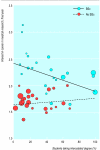Intercalated degrees, learning styles, and career preferences: prospective longitudinal study of UK medical students
- PMID: 10463892
- PMCID: PMC28204
- DOI: 10.1136/bmj.319.7209.542
Intercalated degrees, learning styles, and career preferences: prospective longitudinal study of UK medical students
Abstract
Objectives: To assess the effects of taking an intercalated degree (BSc) on the study habits and learning styles of medical students and on their interest in a career in medical research.
Design: Longitudinal questionnaire study of medical students at application to medical school and in their final year.
Setting: All UK medical schools.
Participants: 6901 medical school applicants for admission in 1991 were studied in the autumn of 1990. 3333 entered medical school in 1991 or 1992, and 2695 who were due to qualify in 1996 or 1997 were studied 3 months before the end of their clinical course. Response rates were 92% for applicants and 56% for final year students.
Main outcome measures: Study habits (surface, deep, and strategic learning style) and interest in different medical careers, including medical research. Identical questions were used at time of application and in final year.
Results: Students who had taken an intercalated degree had higher deep and strategic learning scores than at application to medical school. Those with highest degree classes had higher strategic and deep learning scores and lower surface learning scores. Students taking intercalated degrees showed greater interest in careers in medical research and laboratory medicine and less interest in general practice than their peers. The effects of the course on interest in medical research and learning styles were independent. The effect of the intercalated degree was greatest in schools where relatively few students took intercalated degrees.
Conclusions: Intercalated degrees result in a greater interest in research careers and higher deep and strategic learning scores. However, the effects are much reduced in schools where most students intercalate a degree. Introduction of intercalated degrees for all medical students without sufficient resources may not therefore achieve its expected effects.
Figures



References
-
- Tamber PS. MRC withdraws intercalated degree funds. BMJ. 1996;312:1117–1118.
-
- Attwell D, Boyd R. Withdrawal of medical research council funding for intercalated BSc students. Lancet. 1996;348:198. - PubMed
-
- Tait N, Marshall T. Is an intercalated BSc degree associated with higher marks in examinations during the clinical years? Med Educ. 1995;29:216–219. - PubMed
Publication types
MeSH terms
LinkOut - more resources
Full Text Sources
